Upper School
Welcome from the Director
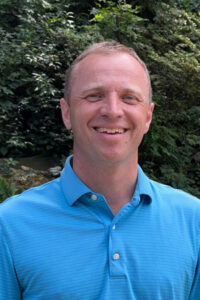 The heart of a Renbrook education is the meaningful relationships that develop between our accomplished and deeply committed faculty and our inspired and engaged students. Across the curriculum and in every grade level, Renbrook students grow into active and inquisitive readers, clear and sophisticated writers, and capable and confident self-advocates. We believe that the foundation for success in secondary school is solidified in these all-important middle school years.
The heart of a Renbrook education is the meaningful relationships that develop between our accomplished and deeply committed faculty and our inspired and engaged students. Across the curriculum and in every grade level, Renbrook students grow into active and inquisitive readers, clear and sophisticated writers, and capable and confident self-advocates. We believe that the foundation for success in secondary school is solidified in these all-important middle school years.
Our Upper School, comprised of grades 5-8, provides a rigorous and enriched program of academic excellence through our challenging and ever-evolving curriculum. As students mature from childhood into adolescence, they gain numerous opportunities for academic and social-emotional growth. In addition to the core subjects of English, mathematics, science, Humanities, and history, our students learn French, Spanish, or Latin. They also participate in music, athletics, service, and the visual and performing arts. But learning at Renbrook is not limited to the classroom; our ropes course, woods, trails, sports fields, and cultivated gardens, provide a safe, varied, and beautiful outdoor classroom and learning laboratory. With more than 30 established spaces across campus, outdoor learning abounds at Renbrook, and our students thrive!
Each grade in the Upper School benefits from signature projects that "bring learning to life." Traditions like the daily Morning Meeting are uniquely Renbrook, kindling a collective sense of community and agency while providing ample opportunity for individual growth. These experiences strengthen public speaking skills, peer recognition, and leadership development creating confident, resourceful, and courageous Renbrook graduates.
I’m so pleased that your family is considering Renbrook, and I welcome the opportunity to talk more when you visit.
Warm Regards,
Jim O’Donnell
Jim is the Head of Upper School. He made his way to West Hartford for the start of the 2003-04 school year by way of Alexandria, VA, where he taught middle school math, coached two varsity sports, and advised at St. Stephen’s & St. Agnes School. He first became familiar with the benefits and outstanding qualities of a Renbrook education as the Director of Enrollment Management at Kingswood Oxford School, where he interviewed and developed relationships with numerous Renbrook families for admission. Reflecting on his early impressions of Renbrook students while working in admissions, Jim shared:
“Renbrook students stand out for their poise, academic preparation, sense of self, and remarkable involvement in their school and local communities!”
From 2015-23, Jim ran the academic summer program at Loomis Chaffee for students rising into grades 7-10. This mission-driven program provided enrichment to enthusiastic learners from all over the world. Jim also partnered with the faculty to embed a social-emotional learning and leadership curriculum designed to increase students’ awareness of their best self and phenomenal capacity to impact the common good. During this time span, Jim also completed a Master of Arts in Organizational Leadership at Gonzaga University and served on the Board of Trustees at an independent school that serves students in Preschool through Grade 8.
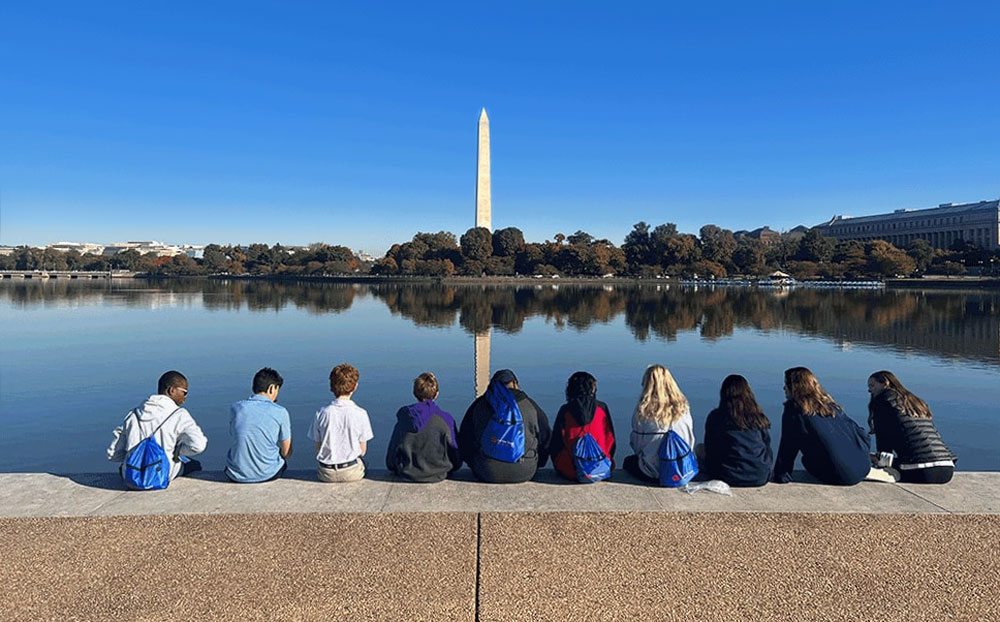
Upper School students are scientists, writers, mathematicians, leaders, designers, engineers, historians, athletes, performers, buddies, friends, engaged citizens, adventurers and so much more. Renbrook is a place where you will be encouraged to stretch, explore, and take flight.
A Day in the Life
Morning Meeting
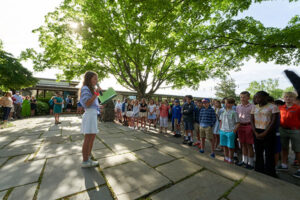 We start each day in community. Led by our eighth-grade student leaders, Morning Meeting is a time to hear what’s going on around our busy campus. Whether it’s a recap of a recent game, student presentations on a range of topics from service learning to celebrations of our diverse community, performances in Latin, French and Spanish, jokes, or Minute-To-Win-It games, each community member has an opportunity to contribute, developing confidence and public speaking skills.
We start each day in community. Led by our eighth-grade student leaders, Morning Meeting is a time to hear what’s going on around our busy campus. Whether it’s a recap of a recent game, student presentations on a range of topics from service learning to celebrations of our diverse community, performances in Latin, French and Spanish, jokes, or Minute-To-Win-It games, each community member has an opportunity to contribute, developing confidence and public speaking skills.
Academic Block #1
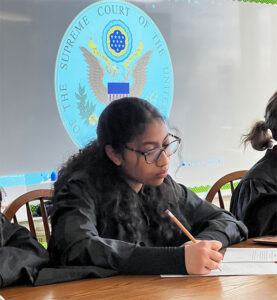 You’ve done your research and submitted your legal brief, now it’s time to deliver opening arguments in front of the Supreme Court. Students in U.S. Government and Civics learn about the Constitution and branches of government through the study of primary sources, current events, case studies, mock trials, and debate. Students hone their skills in writing and rhetoric by exploring answers to questions such as "Should we abolish the Filibuster?", "What role do Super PACs play in our elections?", or "What factors influence immigration policy?"
You’ve done your research and submitted your legal brief, now it’s time to deliver opening arguments in front of the Supreme Court. Students in U.S. Government and Civics learn about the Constitution and branches of government through the study of primary sources, current events, case studies, mock trials, and debate. Students hone their skills in writing and rhetoric by exploring answers to questions such as "Should we abolish the Filibuster?", "What role do Super PACs play in our elections?", or "What factors influence immigration policy?"
Academic Block #2
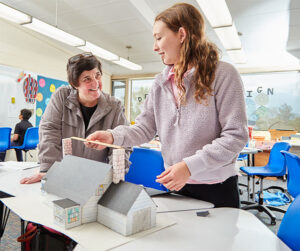 Math students at Renbrook learn to apply mathematical concepts through real-world applications and projects. Whether they're creating structures from real architectural plans, measuring the height of buildings around campus using trigonometric functions, creating budgets and calculating compounding interest, or sending a doll bungee jumping, math at Renbrook brings learning to life!
Math students at Renbrook learn to apply mathematical concepts through real-world applications and projects. Whether they're creating structures from real architectural plans, measuring the height of buildings around campus using trigonometric functions, creating budgets and calculating compounding interest, or sending a doll bungee jumping, math at Renbrook brings learning to life!
Break/ Outside
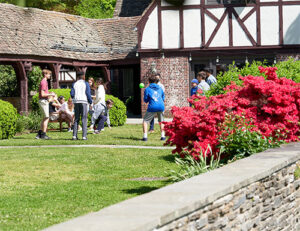 It’s time for midmorning Break! We acknowledge students need varied blocks of learning and movement breaks, so students play a game of Whiffle ball, catch up with friends, meet with a teacher, and have a healthy snack.
It’s time for midmorning Break! We acknowledge students need varied blocks of learning and movement breaks, so students play a game of Whiffle ball, catch up with friends, meet with a teacher, and have a healthy snack.
Academic Block #3
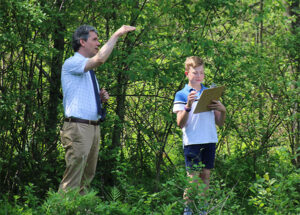 Our 75-acre campus is our most beautiful classroom, and it is in use year-round in our science classes. Students in Life Science track the changing seasons and life cycles of flora and fauna through their yearlong “Vantage Point Projects.” Throughout their time at Renbrook, students learn about the natural world through the study of dendrology, environmental stewardship, and even create a “life list” of birds, starting with many who nest on campus including chimney swifts, bald eagles, and our school mascot, the red-tailed hawk.
Our 75-acre campus is our most beautiful classroom, and it is in use year-round in our science classes. Students in Life Science track the changing seasons and life cycles of flora and fauna through their yearlong “Vantage Point Projects.” Throughout their time at Renbrook, students learn about the natural world through the study of dendrology, environmental stewardship, and even create a “life list” of birds, starting with many who nest on campus including chimney swifts, bald eagles, and our school mascot, the red-tailed hawk.
Lunch/WIN
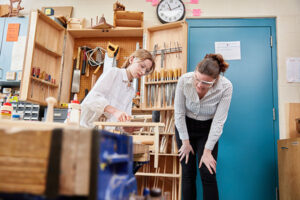 Following a healthy lunch and opportunities to connect with friends, Upper School students transition to WIN, which stands for “What I Need.” A time of day when every community member can focus on an area of academic or artistic growth, our students engage in service and enjoy time to play and recharge. WIN offerings are unique to each grade level and include extra help and review sessions, musical ensemble rehearsals, open studio time in the Art and STEAM rooms, Student Council meetings, and recess on the Gengras Family Field.
Following a healthy lunch and opportunities to connect with friends, Upper School students transition to WIN, which stands for “What I Need.” A time of day when every community member can focus on an area of academic or artistic growth, our students engage in service and enjoy time to play and recharge. WIN offerings are unique to each grade level and include extra help and review sessions, musical ensemble rehearsals, open studio time in the Art and STEAM rooms, Student Council meetings, and recess on the Gengras Family Field.
Academic Block #4
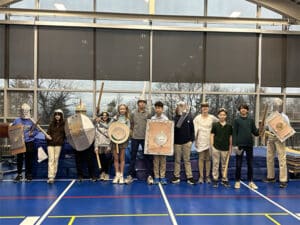 Hola! Bonjour! Salve! Exploring World Languages in Upper School begins in Grade 5, where students get acquainted with Spanish, French, and Latin, each for a trimester. Thereafter, students choose one language to study for the remainder of their Upper School years. Proficiency is achieved through predominantly using the target language in conversational activities and with popular projects like the Latin Gladiator Games, reading a Spanish novel together, and researching and presenting on the traditions of French-speaking countries.
Hola! Bonjour! Salve! Exploring World Languages in Upper School begins in Grade 5, where students get acquainted with Spanish, French, and Latin, each for a trimester. Thereafter, students choose one language to study for the remainder of their Upper School years. Proficiency is achieved through predominantly using the target language in conversational activities and with popular projects like the Latin Gladiator Games, reading a Spanish novel together, and researching and presenting on the traditions of French-speaking countries.
Athletics/Study Hall
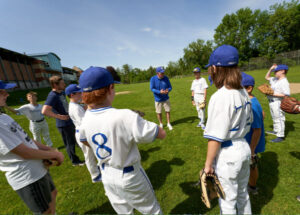 Between 2:00-4:00 PM Monday through Thursday, Upper School students participate in an hour-long study hall and an hour of athletics. Faculty-led study hall provides a dedicated time for students to focus on their homework or projects and to seek support from faculty, helping students develop these essential skills of time management and self-advocacy.
Between 2:00-4:00 PM Monday through Thursday, Upper School students participate in an hour-long study hall and an hour of athletics. Faculty-led study hall provides a dedicated time for students to focus on their homework or projects and to seek support from faculty, helping students develop these essential skills of time management and self-advocacy.
The Upper School athletic program allows students to participate, practice, and play on a team or non-competitive activity. Our program offers something for every student, whether it be non-competitive fun with friends or a more competitive team sport. Students spend an hour each day engaged in the athletic program of their choice, allowing time for exercise, character development, and skill development.